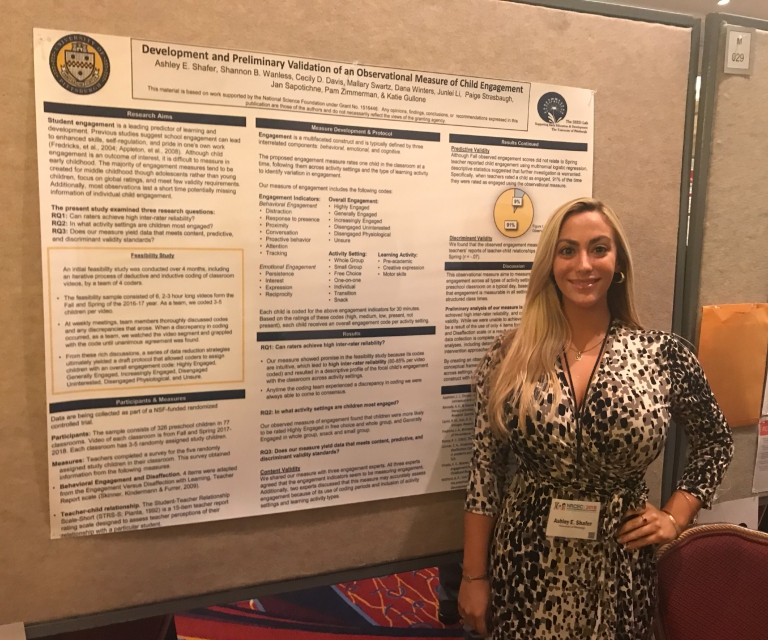
PhD Student Wins Research Award for Examining Teacher Well-Being
Even before the COVID-19 pandemic, Ashley Shafer, a doctoral student in Applied Developmental Psychology at the University of Pittsburgh School of Education, was interested in improving teacher well-being. However, the topic has since taken on new meaning.
The pandemic is placing unprecedented demands — and stress — on America’s teachers. In addition to safety concerns, teachers must adapt their teaching to fit shifting instructional models that, depending on changing virus conditions, may take on the form of in-person, online, or hybrid instruction.
Shafer’s research poster, “Increasing Teachers’ Well-Being and Capacity to Implement through a Community of Practice” won the national prize at the Society for Prevention Research’s 2020 Early Career Preventionist Network (ECPN) Student Poster Contest. She submitted the poster in early March when the shift to remote learning was beginning to take a toll on teacher morale. The award was announced in July 2020.
“It means a lot to me to have our work recognized, especially through a competitive review by a prestigious organization in the field like the ECPN,” says Shafer. “Receiving this recognition was very unexpected. I’m humbled and honored.”
Shafer is the outgoing president of the Council for Graduate Students in Education. She developed her research poster through graduate courses at the Pitt School of Education with faculty members Rip Correnti and Lindsay Page. She also worked closely with her dissertation advisor and poster co-author Dr. Shannon Wanless, director of the Office of Child Development where Shafer serves as a Student Fellow.
“In general, early childhood teachers in the U.S. are experiencing low levels of well-being,” says Shafer. “Low teacher well-being is problematic, in part, because it can limit teachers’ capacity to cultivate high-quality classroom environments that are responsive to children’s developmental needs and academic success.”
The winning research poster was based on Shafer’s original research into teacher well-being. She was part of a team that conducted a randomized control trial with 81 preschool teachers that investigated the effects of a Community of Practice intervention called “Simple Interactions” on teacher well-being and their capacity to implement new teaching practices in the fall term.
The findings suggest that teacher well-being is important for being ready to implement new practices. It also suggests that being part of a community of practice promotes psychological safety and can increase teachers’ capacity to implement new practices in the future.
“We found that developing teachers’ psychological safety through a community of practice may be one approach to supporting teacher well-being and building the capacity of the teacher workforce to manage the ever-changing demands on their teaching practices,” says Shafer. “I plan to continue this line of research, studying teacher well-being and how to bolster it through a community of practice intervention model.”
Wanless, the director of the Office of Child Development, has worked closely with Shafer for several years.
“Ashley’s research represents our Applied Developmental Psychology department’s commitment to conducting research that addresses the most pressing problems that practitioners face,” says Wanless. “I am incredibly proud of Ashley’s dedication to using rigorous research methods to examine real-world problems. She has an incredible career ahead of her of working with community partners to use research to make a positive impact on the field.”
Learn more
Applied Developmental Psychology at the University of Pittsburgh School of Education
The Office of Child Development




